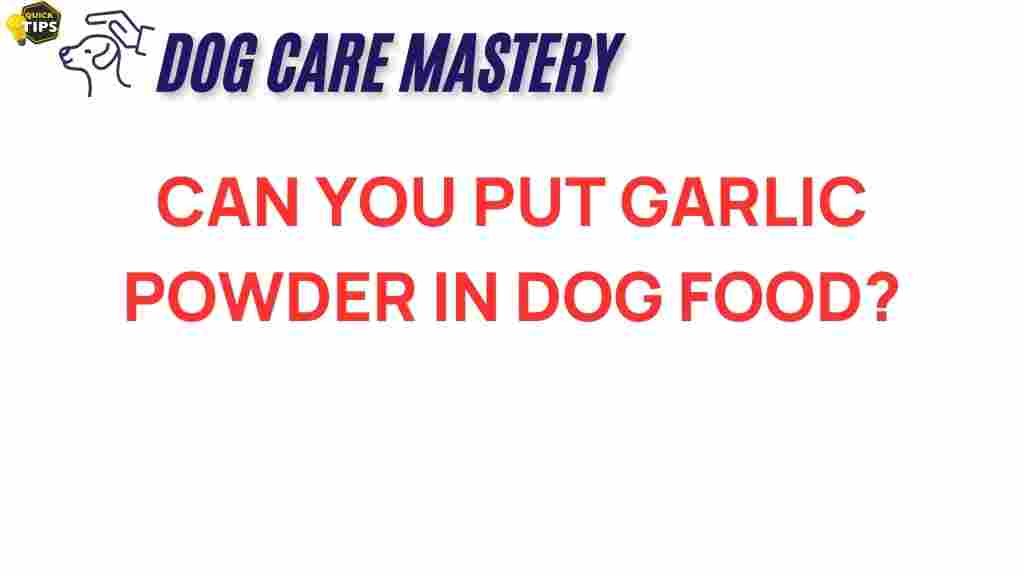Unveiling the Truth: Can Garlic Powder Benefit Your Dog’s Diet?
As dog owners, we constantly seek ways to enhance our furry friends’ diets, ensuring they receive all the necessary nutrients for a healthy life. One ingredient that often comes up in discussions is garlic powder. While garlic is a staple in many human diets, the question remains: can garlic powder benefit your dog’s diet? This article will explore the potential advantages and risks of incorporating garlic powder into your dog’s meals.
Understanding Garlic Powder
Garlic powder is derived from dehydrated garlic cloves, ground into a fine powder. It is commonly used as a seasoning in various cuisines due to its strong flavor and potential health benefits for humans. However, the implications of garlic powder for dogs are a topic of debate among veterinarians and pet owners alike.
The Nutritional Value of Garlic Powder
Garlic powder contains several beneficial compounds, including:
- Allicin: Known for its antibacterial and antifungal properties.
- Vitamins: Garlic is a source of vitamins B6 and C.
- Minerals: It contains manganese, calcium, and phosphorus.
While these nutrients can be beneficial, it’s essential to understand how they affect dogs specifically.
Potential Benefits of Garlic Powder for Dogs
When discussing garlic powder in a dog’s diet, it’s crucial to consider both the potential benefits and drawbacks. Some proponents argue that garlic can offer the following advantages:
1. Natural Flea and Tick Repellent
Some pet owners claim that garlic powder can act as a natural repellent for fleas and ticks. The theory is that the sulfur compounds in garlic can be excreted through your dog’s skin, making them less attractive to these pests. However, scientific evidence supporting this claim is limited.
2. Antioxidant Properties
Garlic powder contains antioxidants that can help combat oxidative stress in dogs. Antioxidants are essential for maintaining overall health and may contribute to a stronger immune system.
3. Possible Heart Health Benefits
Some studies suggest that garlic may support cardiovascular health through its ability to reduce cholesterol levels and improve circulation. However, the effects of garlic powder on dogs specifically require more research.
How to Safely Incorporate Garlic Powder into Your Dog’s Diet
If you decide to introduce garlic powder into your dog’s meals, it’s vital to do so cautiously and in moderation. Here’s a step-by-step process:
Step 1: Consult Your Vet
Before adding any new ingredient to your dog’s diet, consult with your veterinarian. They can provide guidance based on your dog’s health status and dietary needs.
Step 2: Choose Quality Garlic Powder
Ensure that the garlic powder you choose is 100% natural, without added preservatives or other harmful ingredients. Organic options are often the best choice.
Step 3: Start with a Small Amount
Begin with a tiny amount, such as 1/8 teaspoon for small dogs and 1/4 teaspoon for larger breeds. Monitor your dog for any adverse reactions.
Step 4: Observe Your Dog’s Response
Keep an eye on your dog for any changes in behavior, digestion, or health after introducing garlic powder. If you notice any negative symptoms, discontinue use immediately.
Step 5: Adjust Accordingly
If your dog tolerates garlic powder well, you can gradually increase the amount. However, always keep the quantity moderate, as excessive garlic consumption can be harmful.
Potential Risks and Concerns
While there are potential benefits to using garlic powder, it’s essential to be aware of the risks associated with garlic consumption in dogs:
1. Toxicity
Garlic, especially in large amounts, can be toxic to dogs. It contains compounds that can damage red blood cells, leading to anemia. Symptoms of garlic toxicity include:
- Vomiting
- Diarrhea
- Abdominal pain
- Lethargy
- Weakness or collapse
2. Allergic Reactions
Some dogs may have an allergic reaction to garlic. Signs of an allergy can include itching, swelling, and gastrointestinal upset. If you suspect an allergy, consult your veterinarian immediately.
3. Interaction with Medications
Garlic can interact with certain medications, particularly blood thinners. If your dog is on medication, discuss the use of garlic powder with your veterinarian.
Troubleshooting Tips
If you’re considering adding garlic powder to your dog’s diet but are concerned about potential issues, here are some troubleshooting tips:
1. Monitor for Side Effects
Always keep track of how your dog reacts after introducing garlic powder. If you notice any adverse effects, stop using it immediately.
2. Gradual Introduction
Introduce garlic powder slowly and in small amounts to gauge your dog’s tolerance. This method allows you to identify any potential issues early on.
3. Consult Your Vet Regularly
Regular check-ups with your veterinarian can help ensure that your dog’s diet remains healthy and balanced. They can provide personalized advice based on your dog’s specific needs.
Conclusion
In conclusion, while garlic powder may offer some potential benefits for dogs, it is essential to approach its use with caution. Always consult with your veterinarian before making any changes to your dog’s diet. Monitor your dog closely for any negative reactions, and remember that moderation is key. By doing so, you can help ensure that your dog’s diet remains healthy and supportive of their overall well-being.
For more information on dog nutrition and safe dietary practices, check out this helpful resource: Dog Nutrition Guidelines.
Also, consider reading about safe herbs and spices for pets: Herbs and Spices for Dogs.
This article is in the category Nutrition and created by dogcaremastery Team
